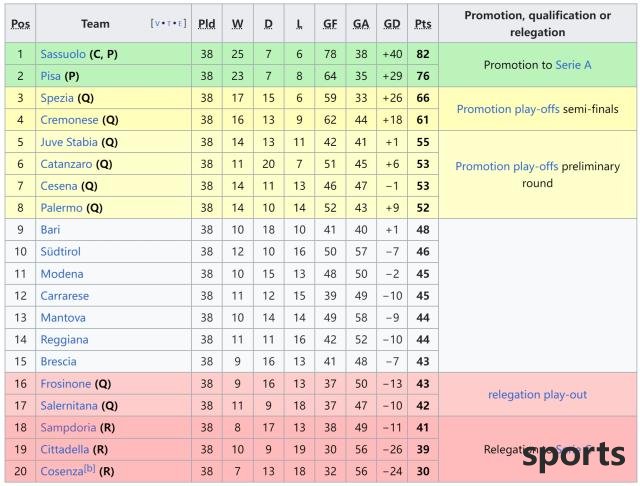Addy Dports > Football > Wang Qinbo: Retaining the opponent s scandal? Sampdoria should not be happy too early
Wang Qinbo: Retaining the opponent s scandal? Sampdoria should not be happy too early
Sports Weekly All-Media Reporter Wang Qinbo
The author wrote a special article not long ago to tell the behind-the-scenes story of Sampdoria's decline into Serie C. With a roundabout way, Sampdoria, who was originally destined to fall into the abyss, is now likely to stay in Serie B through the playoffs.
According to the standings at the end of the Serie B League, Sampdoria with 41 points ranked third from the bottom and was directly relegated, Flosinone with 43 points and Sarenitana with 42 points played in the playoffs, and decided to have the last relegation spot. However, due to the sudden false tax filing scandal of Brescia, the club, which had 43 points with Frosinone and ranked higher with the match results, may be relegated to the penalty, so Frosinone will be directly relegated, while Sampdoria can play a playoff with Sarenitana to decide who stays in the Serie B. The fuse of the

matters stems from a seemingly conventional financial operation. On February 17 and April this year, Brescia submitted its employees' wage tax returns as scheduled. This statement is called F24 in Italy, which is a comprehensive statement that represents that the company has paid various tax insurance fees for employees (including long-term and temporary employees). Two of the important items are IRPEF and INPS - IRPEF is personal income tax, which is paid by the employer, and INPS is social security, including the part deducted from the employee's salary and the part paid by the employer. In addition, there are a small number of other taxes, such as INAIL, namely labor accident and occupational disease insurance, and local taxes.
Because Italian law stipulates that employers pay personal income tax and social security on their behalf, this makes Italian professional football regard personal income tax and social security on their behalf as part of the normal payment of wages. If the salary is paid but the personal income tax and social security are not paid on behalf of the person, it will also be regarded as a form of wage arrears. In each verification window, violations of each payment project may result in deduction of 2 league points.
Brescia Club in total required employees (mainly players) to pay nearly 2.4 million euros in personal income tax and social security in February and April, but the boss Celino doesn't want to pay that much. So the club purchased a tax relief amount of 2.4 million euros from another company for about 2 million euros, and used this tax deduction amount to deduct the personal income tax and social security they should pay, which was equivalent to saving about 400,000 euros of expenditure.
The problem is that these tax deductions purchased by Brescia are fake! When they first used this amount to offset F24 in February, the Italian football financial regulator felt suspicious and asked the tax department for inquiries, which did not reply until early May to confirm that Brescia's tax deduction amount was invalid!
This is why Samp suddenly had the possibility of resurrection, while Sarenitana couldn't figure out who his opponent was in the playoffs. Now we need to wait for the official judgment of the football judge before the playoffs can be held. It is not ruled out that the playoffs will be held in early June, and it has been half a month since the end of the Serie B League.
The "tax deduction right" in the Italian tax system comes from many aspects. Some are because enterprises make a large amount of purchases, and the large amount of VAT expenditure accumulated in the procurement invoice is not offset by the VAT generated in the turnover. Some come from government laws that provide tax deductions to encourage investment, employment and technology upgrades. These tax deductions can be used to offset contributions in employee wages Form F24.
However, this mechanism has created a gray "tax credit market" in Italy. The intermediary company purchases the tax deduction amount in large quantities and then resells it to other companies and clubs at a discount. On the surface, these transactions are legal, but in fact they are easily a breeding ground for fiction, duplication and forgery of credit. The provider of the transactions involved in the
Brescia Club is the company registered in Milan "GruppoAlfieriSpv". The company is the sole director of a young man, Gianluca Alfieri, who is only 25 years old, with a capital of only €25,000. However, the "deduction amount" sold by the intermediary to two football clubs, Brescia and Trapani, has reached 3 million euros.

Brescia Club Chairman Massimo Cellino (pictured above) has always had a bad reputation. In addition to his favorite coaching, he is also considered a deadbeat. When he was Cagliari's boss in the past, a lawyer asked the court to enforce the confiscation of his property because Celino had long owed attorney fees.
This time, Cellino pushed the responsibility to the accountant, saying that this was based on the accountant's advice, and the accountant guaranteed that the agency was "good reputation". Cellino thought he was a "victim" and was deceived.
Brescia violated the rules twice in February and April. At present, the violations in February have basically been confirmed. The two unpaid funds will be deducted at least 4 points. If the violations in April are also confirmed, they will face a maximum of 8 points deduction.
In fact, it is not uncommon to use fictitious amounts to alleviate the pressure of capital flow in Italian football, especially in leagues such as Serie B and Serie C. In addition to the Brescia and Trapani clubs involved in this case, there were two previous Serie C clubs Regina and Taranto, whose ultimate fate was to go bankrupt and disappear from the professional league.
Due to the widespread problem of this phenomenon, the Italian Football Association has held a joint meeting with the Italian Taxation Bureau, hoping to carry out in-depth cooperation on this issue, and plans to promote the establishment of a real-time tax deduction verification mechanism to block the systematic delay caused by "post-review". At the same time, there are also voices calling for the establishment of a "tax intermediary whitelist system" to promote information disclosure and curb gray transaction chains.
If Brescia is relegated in the end and Sampdoria is relegated, it cannot be considered a blessing for Italian football, and it may not even be sure that Sampdoria will play in Serie B in the end. Because Samp's own debt problem is too serious, it is also a question whether he can pass the registration qualification review next season.
Related Posts
Muller: It s a team battle against Los Angeles, but I understand people saying it s Son vs. Muller
FootballNovember 22 News Tomorrow at 10:30, the Vancouver Whitecaps will face Los Angeles FC in the MLS Western Conference semifinals. Muller was interviewed and talked about the topic of his upcoming match against Son Heung-min. When asked if he would be m...
【Football】
moreRomano: Mendes recommended Adeyemi to Inter Milan and many other clubs, but he wants to go to the Premier League
FootballNovember 22 News Not long ago, Romano talked about the rumors between Inter Milan and Adeyemi on his channel. He said: "Adeyemi is a name that has been mentioned in the last few hours. He is looking for new opportunities, he may leave in 2026,...
【Football】
moreEach body predicts Barcelona VS Biba starting line-up: Lewand Yamal leads the striker, Juan Garcia starts
FootballNovember 22 News At 23:15 on November 22, in the 13th round of the 2025-26 La Liga season, Barcelona will play at home against Athletic Bilbao. Before the game, "Daily Sports" wrote an article analyzing Flick's current choices and pred...
【Football】
more
Hot Posts
- Bayern is the only team that has never trailed in the league this season and has not conceded a goal in the first half.
- Champions League | The fourth round of the league stage starts in the early morning of the 5th. Who will lead the two focus battles?
- Kimmich vs. Borussia Monchengladbach statistics: 1 goal, 96% pass success rate, 2 key passes
- The salary in the team is down! Western media: Guler’s annual salary is 5.2 million euros, and Real Madrid hopes to increase it to 9 million.
- Round 11 of the League One: Stevenic tops with 3 consecutive wins, Bolton leads the scorer list with 7 goals
- 41 goals were made in 52 games in the peak season, with a net worth of 160 million, a weekly salary of 300,000 yuan, and no ball to play
- Wagner: Feller s family cried after being hit, but Boe did not apologize at first
- Italian media: Bologna is close to signing Aslani and will provide him with a five-year contract
- Burnley coach: The 0-3 loss to Tottenham was disappointing, but the team showed something positive
- If Messi doesn t come, it s his own business, it has nothing to do with Laporta
Recent Posts
-
Here We Go! Chelsea spent another 43 million to defeat Ajax s 19-year-old talented defender!
-
Teshi refused to disclose medical reports because she was not worried about privacy. If she still did not sign the conflict in the end, the conflict may escalate
-
All-time scorers after four rounds of the Bundesliga: Kane and Gilasi tied for second place, both scoring 8 goals
-
Next Foden? Why is Real Madrid willing to spend 40 million on 17-year-old Mastantono
-
After understanding Heysen s performance, he understood why Real Madrid was willing to equip him with a top partner.
-
British media: Everton and Burnley will compete with Naples Benfica midfielder Florentino
-
Nwaneri’s statistics for this game: 1 goal, 1 key pass, 17 possessions lost
-
Juventus starts Comolly era, chasing free agent David, Inter Milan coach Inzaghi resigns
-
Kill Ma Su with tears! It is revealed that Real Madrid decided to sell Rodrigo by buzzer! Alonso signed Premier League star
-
Ferdinand: No one creates opportunities for Sheshko at all. At present, it is a distant goal to enter the top four.